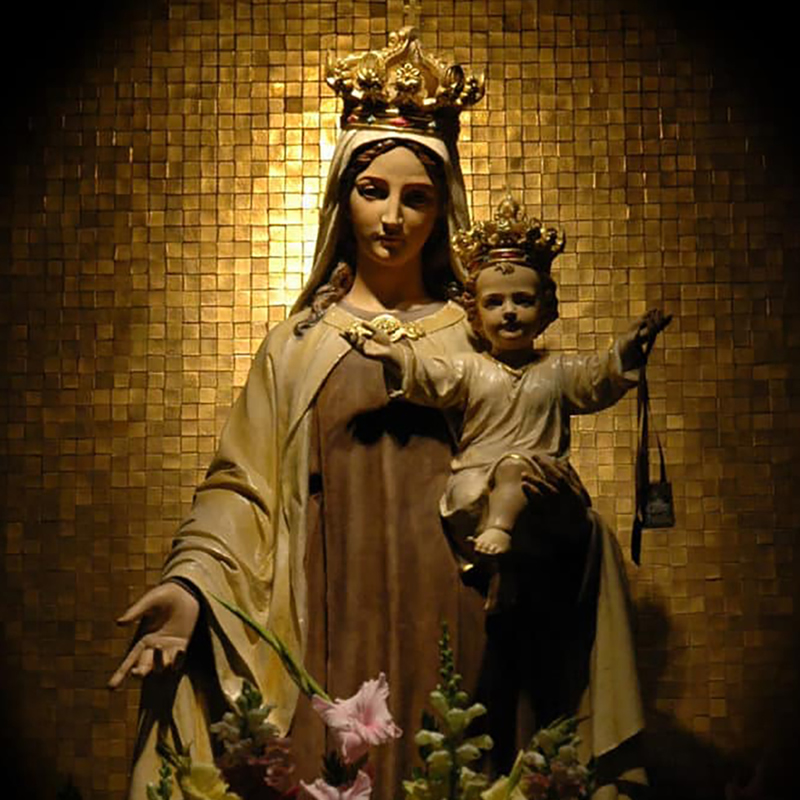The Sacraments of Confirmation, First Eucharist, and Reconciliation
For more information about Sacrament Preparation classes, or to register your child, CLICK HERE.
“Just as Christ, after His baptism and the coming upon Him of the Holy Spirit went forth and defeated the adversary, so also with you. After holy Baptism and the Mystical Chrism, having put on the full suit of armor of the Holy Spirit, you are to withstand the power of the adversary, and defeat him, saying, ‘I am able to do all things in Christ, who strengthens me.’”
What is Confirmation?
Confirmation is the second of the three sacraments of Christian initiation. Confirmation is the completion of Baptism and the sacrament by which the baptized faithful are anointed with chrism by the laying on of hands. The grace received is the fullness of the Holy Spirit and his gifts. We also describe this fullness as the completion, strengthening, or perfection of the Holy Spirit received in Baptism.
Who can receive the Sacrament of Confirmation?
According to our diocesan policy, the normal age for confirmation are those baptized children in third grade (usually around the age of eight years old). A candidate for confirmation must be at the age of discretion, seven years of age or above and must meet the following requirements:
• Be baptized and not previously confirmed
• Must be Catholic (children baptized in another church must make a Profession of Faith)
• Must be properly instructed
• Must be capable of renewing their Baptismal promises
• Must have previously been prepared for and received the Sacrament of Reconciliation (ordinarily occurs in Second Grade)
Candidates will be prepared for the Sacrament of Confirmation and First Eucharist. Both Sacraments will be celebrated together.
To learn about the policy and guidelines in the Diocese of Phoenix for sacramental preparation, please visit the following link: The Restored Order of the Sacraments of Initiation.
“Here is the Church’s treasure, the heart of the world, the pledge of the fulfillment for which each man and woman, even unconsciously, yearns. A great and transcendent mystery, indeed, and one that taxes our mind’s ability to pass beyond appearances. Here our senses fail us . . . In the Eucharist we have Jesus, we have his redemptive sacrifice, we have his resurrection, we have the gift of the Holy Spirit, we have adoration, obedience and love of the Father. Were we to disregard the Eucharist, how could we overcome our own deficiency?”
What is Holy Eucharist?1
After Baptism and Confirmation, the Eucharist is the third sacrament of initiation of the Catholic Church. The Eucharist is the mysterious center of all these sacraments, because the historic sacrifice of Jesus on the Cross is made present during the words of consecration in a hidden, unbloody manner. Thus the celebration of the Eucharist is “the source and summit of the Christian life”.
Holy Eucharist is the sacrament in which Jesus Christ gives his Body and Blood himself for us, so that we too might give ourselves to him in love and be united with him in Holy Communion. In this way we are joined with the one Body of Christ the Church.
-------
1 YOUCAT #208
“Daughter, when you go to confession, to this fountain of My mercy, the Blood and Water which came forth from My Heart always flows down upon your soul and ennobles it. Every time you go to confession, immerse yourself in My mercy, with great trust, so that I may pour the bounty of My grace upon your soul. When you approach the confessional, know this, that I Myself am waiting there for you. I am only hidden by the priest, but I myself act in your soul. Here the misery of the soul meets the God of mercy. Tell souls that from this fount of mercy souls draw graces solely with the vessel of trust. If their trust is great, there is no limit to My generosity. The torrents of grace inundate humble souls. The proud remain always in poverty and misery, because My grace turns away from them to humble souls.”
Why do we need the sacrament of Reconciliation?1
Baptism does snatch us from the power of sin and death and brings us into the new life of the children of God, but it does not free us from human weakness and the inclination to sin. That is why we need a place where we can be reconciled with God again and again. That place is confession [1425-1426]
What is penance?2
Penance is making restitution or satisfaction for a wrong that has been committed. Penance must not take place exclusively in my head; I must express it in acts of charity and in solidarity with others. One does penance also by praying, fasting and supporting the poor spiritually and materially. [CEC 1434-1439]
Who instituted the sacrament of Penance?3
Jesus himself instituted the sacrament of Penance when he showed himself to his apostles on Easter day and commanded them, “Received the Holy Spirit. If you forgive the sins of any, they are forgiven’ if you retain the sins of any, they are retained” (Jn. 20:22a-23). [1439-1485]
-------
1 YOUCAT #226
2 YOUCAT #230
3 YOUCAT #227
